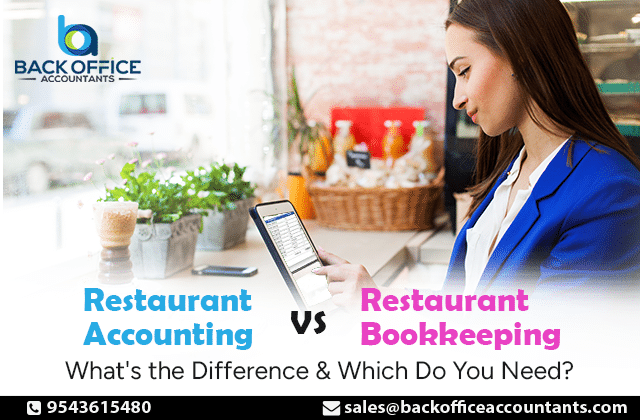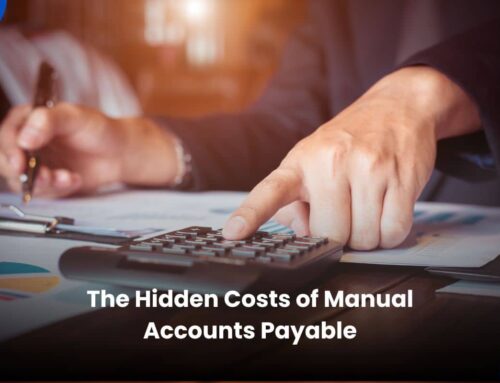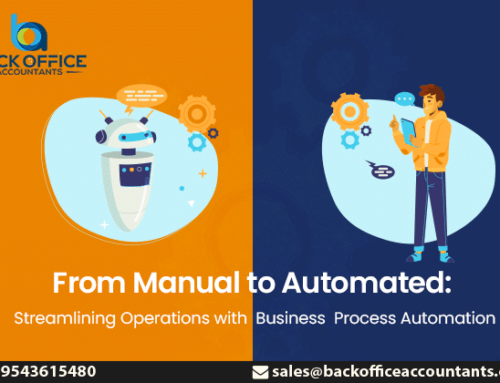Every business firm needs financial accounting or bookkeeping assistance to manage its finances and keep track of the budget formulated. On a personal level, the general public conventionally keeps track of their spending by maintaining effective notes or through the assistance of online applications. Similarly, when you use these financial tactics and principles for a competitive business firm, it is termed as financial accounting.
The accounts maintained play a vital role in analyzing the costs incurred and the profits the concerned business generates. The data recorded are also used to formulate strategies to enhance the business entity’s performance. This is where restaurant accounting and restaurant bookkeeping comes in. While both concepts are interrelated, there is a fine line of difference.

What is Restaurant Accounting?
Restaurant accounting refers to those processes that record, analyze, and manage all the financial transactions in a restaurant. Restaurant accounting services are a part of financial management, which helps the business understand its budgeting, prepare for taxes, and help strategically plan for the future.
Restaurant accounting is instrumental in helping owners and managers manage costs, optimize revenue, and make informed decisions to ensure financial stability. Restaurant accounting broadly includes analyzing different kinds of financial statements like income statements, balance sheets, and cash flow statements to understand the restaurant’s financial health and projected performance.
What is Restaurant Bookkeeping?
On the other hand, we have restaurant bookkeeping. Restaurant bookkeeping is a part of the broader restaurant accounting. It focuses on managing the day-to-day transactions carried out in the restaurant and reporting them. Because of restaurant bookkeeping, we can have an accurate track record of all the daily expenses and revenue.
Different types of financial data like sales, salaries, invoices, and expenses are noted through bookkeeping. So, to understand, restaurant accounting is a broader umbrella term for the financial management of a restaurant, while restaurant bookkeeping involves more day-to-day transactions and expenses.
It is not that Accounting is better than bookkeeping or vice versa. Both are essential if any organization or an individual wants to maintain a proper track record of financial health and performance.
What is the Difference between Restaurant Accounting and Restaurant Bookkeeping?
Let us compare both the terms based on a few terms.
Comparing the Primary Objectives
Accounting tasks mainly include financial analysis, budgeting, tax forecasting, and financial decision-making. On the other hand, bookkeeping tasks include recording sales expenses, managing your employees’ payroll, and maintaining financial records in ledgers or accounting software. It is mostly about data entry and record keeping.
Frequency of Maintaining Records
When it comes to frequency, Bookkeeping is practiced regularly or, let’s say, every week to ensure that the financial records are up to date and accurate. On the other hand, restaurant accounting is typically conducted monthly or quarterly, depending on the restaurant’s needs.
The Primary Purpose
The main purpose of restaurant bookkeeping is to maintain accurate financial records to provide a clear picture of the restaurant’s financial transactions and performance for further analysis. The primary purpose of restaurant accounting, on the other hand, is to give the restaurant owners and management insights into the business’s financial performance. It helps them make important strategic decisions about the future planning of the restaurant and managing cash flow.
The Required Skills
Now, concerning the skills involved in bookkeeping, it can be performed by someone with basic accounting knowledge or data entry skills, which can be learned on the job. It does not require talent or a degree, as most bookkeeping is done on accounting software or basic transactions. On the other hand, you need a high level of expertise or a degree to Engage in restaurant accounting.
Final Overview
Depending upon the kind of restaurant and the scalability of your restaurant, you will be the best person to determine what your accounting needs are. In many cases, a lot of organizations use a combination of bookkeeping and accounting to manage finances.
A bookkeeper handles the routine data entry aspects, while an accountant manages the financial planning of the restaurant. It is important to understand that one cannot exist without the other. Ultimately, the choice depends upon the size of your restaurant, its financial complexity, and long-term goals.
If you want to engage in bookkeeping and accounting services for your business, you can check out the various service offerings of Outsourced Bookkeeping. They engage in various accounts receivable services to keep your business process smooth and your financial records straight.






